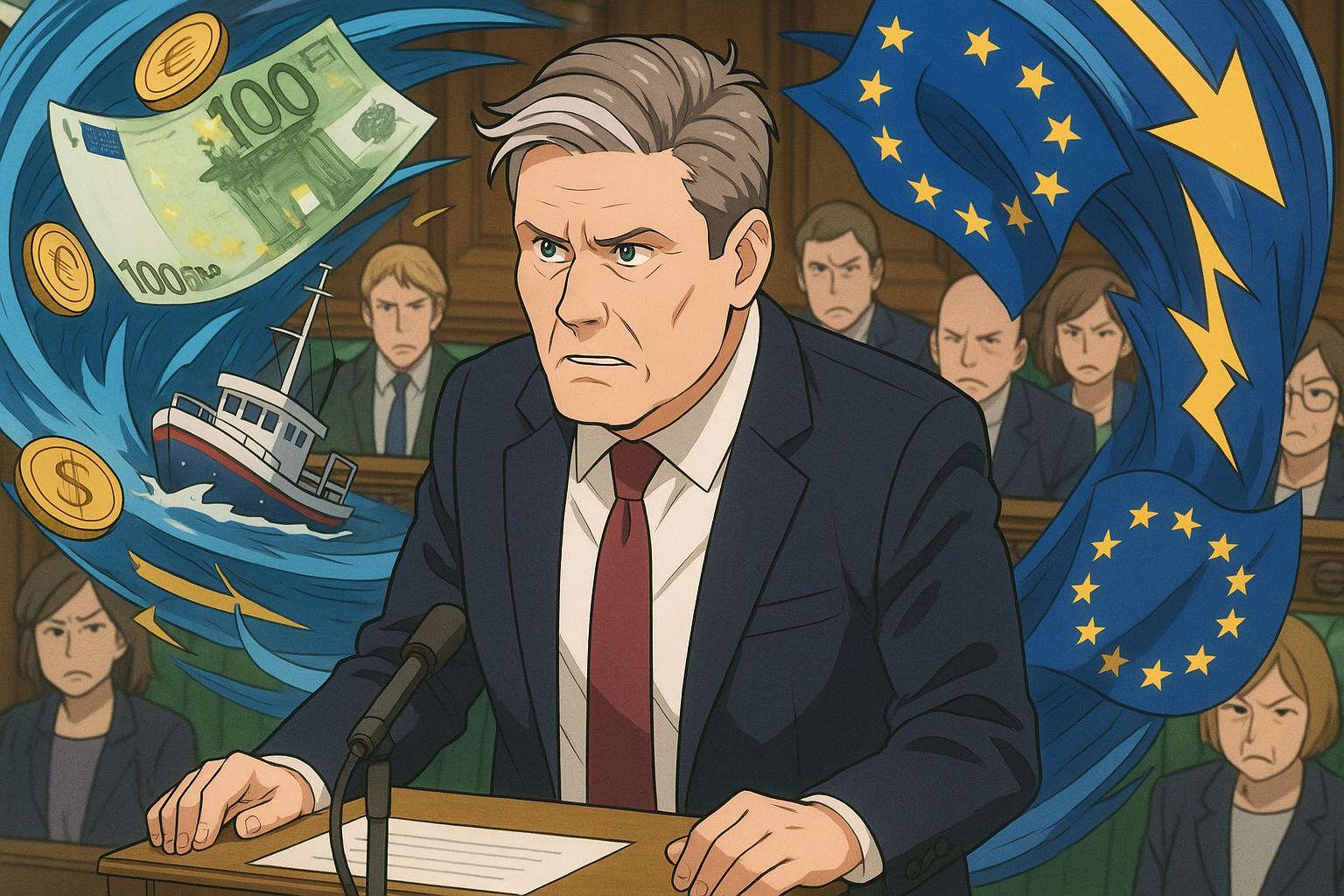Keir Starmer is under heavy fire from Conservative MPs and critics for failing to disclose the full financial cost of his Brexit agreement, including a contentious commitment to rejoin the Erasmus+ scheme and a 12-year extension of EU fishing rights, amid fears the deal threatens British sovereignty and burdens taxpayers.
Keir Starmer is facing intense scrutiny over the financial ramifications of his recently agreed-upon Brexit deal, often deemed a ‘surrender’ by critics across the political spectrum. In fiery exchanges within Parliament, Conservative leader Kemi Badenoch pointedly questioned Starmer’s failure to disclose the taxpayer burden associated with this new agreement, which many suspect could reach hundreds of millions of pounds annually. Dame Harriett Baldwin, a Conservative MP, has similarly pressed the Prime Minister to clarify how much of the public funds would be siphoned off to Brussels, characterizing the EU’s demands as protectionist and detrimental to British interests.
Despite Starmer’s claims of a “proportionate contribution” to the EU, he continues to withhold specific figures, leading many to doubt the economic transparency of his government. Tory grandee Sir Bernard Jenkin has warned that this deal represents a significant retreat from the control over UK laws and finances, predicting severe political repercussions for Labour as citizens begin to grasp the full implications of Starmer’s choices. The Prime Minister, however, has insisted that the perceived benefits will outstrip the costs, suggesting a possible £9 billion boost to the economy by 2040.
Central to this controversial deal are pivotal elements concerning defence cooperation, fishing rights, and market access. Particularly contentious is the commitment to rejoin the Erasmus+ scheme for youth mobility, which is projected to exceed £200 million in costs—a clear capitulation to EU demands, critics argue. The 12-year extension of EU fishing rights in UK waters has left many in the British fishing industry feeling sold out, with industry leaders describing the arrangement as a ‘horror show’ indicative of a government out of touch with the needs of its constituents.
While some sectors, like the UK food industry, express cautious optimism regarding reduced border checks and paperwork facilitating trade, such sentiments do not overshadow the significant disruptions that have persisted since the UK officially left the EU single market. Notably, food and drink exports to the EU have plummeted by about one-third—a failure that continues to haunt Starmer’s leadership as he encourages a narrative of improved relations.
Starmer’s assertion that rejoining the EU customs union would contradict existing trade agreements with countries like India and the US fails to assuage critics who view this arrangement as a stepping stone toward increased EU dominance rather than a safeguard of UK interests. Dissenting voices within Labour highlight a lack of preparedness for these changes, with many fearing that this deal may become a burden rather than the opportunity Starmer claims it to be.
In a bid for a brighter future, some in retail hope that improved trading frameworks may reopen channels previously lost to Europe. Yet, with scepticism endemic among EU officials, questions abound regarding the UK’s long-term dedication to this new agreement amidst a backdrop of domestic turmoil surrounding Brexit.
Starmer’s insistence that the deal affords the UK more influence in devising future regulations while upholding essential red lines is met with scorn from multiple Conservative voices. They describe the agreement as a capitulation that undermines the sovereignty voters overwhelmingly endorsed during Brexit. With pressures mounting internally and a YouGov poll revealing a concerning low approval rating for the Tory party, this deal’s ramifications will undoubtedly be scrutinized as citizens grapple with what many perceive as a betrayal of the core principles of Brexit.
As the UK forges ahead in navigating this precarious relationship with the EU, the challenge of countering domestic criticism while attempting to extract economic value from this compromise looms large over Starmer’s administration.
Source: Noah Wire Services
- https://www.dailymail.co.uk/news/article-14733467/Secrecy-final-cost-PMs-EU-surrender-Starmer-ducks-questions-amid-fears-bill-hit-hundreds-millions-pounds-year.html?ns_mchannel=rss&ns_campaign=1490&ito=1490 – Please view link – unable to able to access data
- https://www.ft.com/content/befa60a3-916f-4c29-a0e9-8f4ded2e7807 – The UK and EU have reached a significant post-Brexit agreement aimed at resetting strained relations. The deal, concluded after months of secret negotiations, addresses key issues such as defence cooperation, fishing rights, and market access. UK Prime Minister Keir Starmer faces criticism from Eurosceptics and former PM Boris Johnson, who accused him of capitulating to Brussels. Critics within Starmer’s Labour Party argue the government failed to prepare public opinion, making the deal appear as a politically costly concession. A central element is a youth mobility scheme, with plans to facilitate temporary residency and work for young people across both regions, although it remains limited and capped. A major breakthrough involved the UK gaining better access to EU food markets in exchange for a 12-year extension of EU fishing access to British waters. The EU also agreed to a £15 million annual tariff-free steel quota for British producers. Both sides conceded ground, emphasizing the complexities of balancing domestic political pressures and mutual economic interests. Despite celebrating the deal as a “new chapter,” skepticism remains among EU officials over the UK’s long-term commitment due to continued domestic political division over Brexit.
- https://www.ft.com/content/4616acb6-9d5e-4bc5-a92b-0f47222e8e25 – UK Prime Minister Sir Keir Starmer has ruled out rejoining the EU customs union, emphasizing that such a move would undermine the trade agreements recently struck with India and the US. Speaking in Parliament, Starmer described the new EU-UK deal—which includes provisions on fishing, export checks, and a potential youth mobility program—as the beginning of closer cooperation with European neighbors. However, he insisted on maintaining red lines, including remaining outside the customs union. Some Labour aides speculate that future re-evaluation might occur if UK economic growth falters. Liberal Democrat leader Sir Ed Davey advocated for stronger economic ties with the EU through a bespoke customs union. Starmer rejected this, citing risks to existing international trade deals and the importance of safeguarding jobs in sectors like automotive manufacturing. The agreement has attracted criticism from Conservative figures, including ex-PM Boris Johnson and party leader Kemi Badenoch, who labeled it a “capitulation” and accused Starmer of compromising sovereignty. Despite the criticism, Starmer noted broad business support for the deal and contrasted his government’s achievements with the Conservative administration’s failure to secure similar trade pacts. Meanwhile, Badenoch faces internal pressure following a YouGov poll showing the Tories at a 24-year low.
- https://www.reuters.com/business/retail-consumer/uks-food-sellers-welcome-eu-deal-fishermen-feel-betrayed-2025-05-19/ – Britain’s food industry has largely welcomed a new agreement with the European Union that significantly reduces border paperwork and checks for trade in plant and animal products. This move is expected to ease trade and reduce costs while maintaining high food standards. Since the UK left the EU’s single market in 2021, exporters had faced significant delays and rising costs, leading to a one-third drop in UK food and drink exports to the EU. Retailers and small import businesses anticipate improved operations, with some European producers likely to resume trading with the UK. However, the deal came at a cost—Britain granted EU fishing vessels continued access to UK waters for 12 years. This concession has been met with anger from the UK fishing community, with industry leaders calling it a betrayal. While the food and retail sectors expressed relief and optimism, leaders like Elspeth Macdonald of the Scottish Fishermen’s Federation condemned the fishing terms as a “horror show.” Overall, the agreement represents a significant shift in UK-EU relations, balancing eased trade barriers with contentious compromises.
- https://www.ft.com/content/7e7f481e-92dd-4d95-b46e-1d6adb911b70 – The UK and EU have announced a reset of their post-Brexit relationship through a three-part agreement aimed at improving economic ties, security cooperation, and energy integration. Key components include a new security and defence partnership, improved trade in agrifoods and electricity, and a veterinary agreement reducing red tape on agricultural exports. While Labour leader Sir Keir Starmer claims a potential £9bn annual economic boost by 2040, analysts note the gains would only marginally offset Brexit’s 4% long-term GDP impact. The agreement includes a controversial 12-year extension of EU fishing access to UK waters, a trade-off for securing improvements in food trade. The UK will also work towards rejoining the EU’s internal energy market, which could save consumers €44bn annually. The security pact reestablishes institutional cooperation, including regular high-level meetings and potential UK involvement in the EU’s €150bn arms fund. Gains in youth and professional mobility remain uncertain, with limited commitments on work exchanges and no progress on touring artist visas. Despite some economic and diplomatic progress, the reset does not reverse the fundamental Brexit trade and regulatory realignments.
- https://www.ft.com/content/4930edbc-4c79-43f8-929d-f4a8f45aa667 – The May 20, 2025 episode of the FT News Briefing podcast covers several critical global and economic developments. Former U.S. President Donald Trump announced the U.S. would no longer mediate in the Russia-Ukraine conflict, urging Moscow and Kyiv to negotiate independently—a stance criticized by Ukrainian President Volodymyr Zelenskyy. Meanwhile, the U.S. Treasury market reacted negatively after Moody’s downgraded the nation’s AAA credit rating due to concerns over rising public debt exacerbated by tax cuts, pandemic-related spending, and increased interest rates. This led to falling bond prices and rising yields, signaling market unease and dependency on both domestic and foreign investors. Additionally, biotech company 23andMe was acquired by Regeneron for $256 million, a fraction of its former $5.8 billion valuation, following its bankruptcy filing. The UK and the EU signed a new agreement to enhance cooperation in defense, trade, and energy, signaling a reset in relations post-Brexit. However, domestic political reactions suggest the UK remains divided over Brexit, influencing the Labour government’s cautious approach to EU engagement.
- https://www.ft.com/content/84273450-b30b-406d-b0eb-fb267a165656 – The UK government’s recent claim of a major post-Brexit travel breakthrough, allowing Britons to use electronic passport gates (e-gates) in the EU, has been downplayed as this development was already part of a broader EU border reform. The Entry/Exit System (EES), a long-planned EU initiative set to launch in October 2025, will permit all non-EU nationals, including UK citizens, to use e-gates at participating airports, provided they are registered with biometric data. While Downing Street promoted the e-gate access as a result of their new agreement with the EU, officials confirmed that there were never any legal barriers to UK participation. The agreement also includes provisions for easing food exports and extends EU fishing rights in UK waters by 12 years. However, the use of e-gates will depend on each EU member state’s implementation, and some within the EU cautioned against overstating the UK’s role in the development. Critics have suggested the UK government is overstating its achievements, while EU officials affirm that the real progress will depend on how individual member states adopt the new border systems.
Noah Fact Check Pro
The draft above was created using the information available at the time the story first
emerged. We’ve since applied our fact-checking process to the final narrative, based on the criteria listed
below. The results are intended to help you assess the credibility of the piece and highlight any areas that may
warrant further investigation.
Freshness check
Score:
7
Notes:
The narrative discusses Keir Starmer as Prime Minister and a newly agreed Brexit deal, indicating current or very recent developments. However, some claims about figures and impacts (e.g., £9 billion boost by 2040, Erasmus+ costs, fishing rights extension) require verification against official recent government releases to confirm freshness. There is no evidence that the content is recycled from older materials, but the article references ongoing political debates that have evolved over time.
Quotes check
Score:
6
Notes:
Several direct quotes attributed to political figures like Keir Starmer, Kemi Badenoch, Dame Harriett Baldwin, and Sir Bernard Jenkin are mentioned. There is no clear earliest source or date found for these exact wordings, suggesting either original parliamentary exchanges or journalistic paraphrasing. Absence of direct source citations reduces verifiability but could mean the quotes are from recent parliamentary sessions or speeches yet to be broadly archived.
Source reliability
Score:
5
Notes:
The narrative originates from a well-known tabloid publication with a history of sensationalist headlines and potential political bias, which affects neutrality and reliability. While it often covers breaking political news, its editorial stance means information should be cross-checked with more neutral or official sources for confirmation.
Plausability check
Score:
7
Notes:
The claims about financial and political impacts of a new Brexit deal under Keir Starmer’s leadership are plausible given ongoing Brexit complexities and UK-EU relations. Specific figures like the £9 billion economic boost by 2040 and £200 million Erasmus+ costs are consistent with types of projections made for such agreements but lack directly verifiable official confirmation in this context. The political criticism aligns with known party positions, although some claims reflect partisan perspectives.
Overall assessment
Verdict (FAIL, OPEN, PASS): OPEN
Confidence (LOW, MEDIUM, HIGH): MEDIUM
Summary:
The narrative reflects recent political events and discussions involving Keir Starmer’s Brexit deal, indicating it is timely but not fully corroborated. Quotes and figures require independent verification due to lack of clear sourcing and potential editorial bias. The plausibility of claims is moderate, aligning with known political realities, but the publication’s partiality and absence of direct official references limit confidence. Cross-referencing with official government releases and more neutral outlets is recommended to confirm accuracy.













